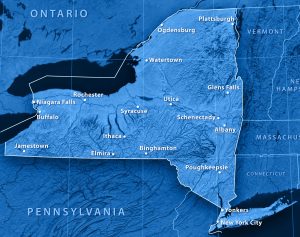 On June 2, 2022, the New York Legislature passed a bill, S6486D, that would place a two-year moratorium on certain new cryptocurrency mining operations at fossil fuel energy plants in New York. The bill would also limit circumstances in which mining operations currently operating at plants in New York would be able to renew the permits or registrations that allow them to operate. However, the bill would not immediately require existing mining operations to cease, and the bill will not become effective unless it is signed by New York Governor Kathy Hochul.
On June 2, 2022, the New York Legislature passed a bill, S6486D, that would place a two-year moratorium on certain new cryptocurrency mining operations at fossil fuel energy plants in New York. The bill would also limit circumstances in which mining operations currently operating at plants in New York would be able to renew the permits or registrations that allow them to operate. However, the bill would not immediately require existing mining operations to cease, and the bill will not become effective unless it is signed by New York Governor Kathy Hochul.
Behind-the-Meter, Proof-of-Work Mining
The bill would only apply to so-called “behind-the-meter” plants that power mining operations—those that supply electricity directly to an on-site user without going through the electric grid. This would cover, for example, cryptocurrency mining operations that acquire energy generation plants and operate those plants to power their mining operations.
The bill would also only apply to proof-of-work operations, which it defines as “a consensus algorithm in a blockchain network used to confirm and produce new blocks to the chain to validate a cryptocurrency transaction, where competitors complete new blocks and where the algorithm changes the complexity of the competition in a manner that is designed to and/or results in increased energy usage for each competitor when the complexity is increased.” Proof-of-work, together with proof-of-stake, are the two major consensus mechanisms used to verify cryptocurrency transactions. (Proof-of-work is the means by which Bitcoin is mined and. requires significant energy output.)
A Moratorium on New Facilities and Renewals
The bill would add a new section to the New York Environmental Conservation Law, which is administered by the New York Department of Environmental Conservation (DEC). DEC is responsible for New York’s air pollution control permit and registration program; facilities that generate air pollution must first obtain and then maintain a DEC permit or registration.
The bill would temporarily prohibit DEC from issuing new permits or registrations to fossil fuel-based electric generating facilities that supply behind-the-meter energy to cryptocurrency mining operations that use proof-of-work authentication methods to validate blockchain transactions. The bill would also prohibit DEC from renewing air permits or registrations for such facilities if the renewal application seeks to increase or would allow or result in an increase in the amount of electric energy consumed or utilized by the cryptocurrency mining operation.
The bill would not immediately impact existing facilities, which could continue to operate. Existing facilities could also renew their permits if they do not seek to increase the energy consumed by the mining operation.
Making an (Environmental Impact) Statement
The bill would also require DEC to prepare an environmental impact statement on cryptocurrency mining operations that use proof-of-work authentication methods to validate blockchain transactions. The bill would require DEC to address a series of issues in the environmental impact statement, including the amount of energy consumed by mining operations, the impact of mining operations on greenhouse emissions, and potential social and economic costs and benefits of mining operations.
Once prepared, the environmental impact statement would be posted to DEC’s website and be subject to a 120-day public comment period. DEC would also be required to host a series of public hearings across New York. Following the comment period and public hearings, DEC would be required to issue a final generic environmental impact statement within one year of the effective date of the bill. Although this final statement would not have an enforceable legal effect, it could serve as the basis for additional legislation and policy proposals. Presumably, the bill’s requirement that DEC publish a final statement within one year of the bill’s effective date was designed to give policy makers an opportunity to act prior to expiration of the two-year moratorium.
Outlook
The bill would take effect immediately upon signature by Gov. Hochul. However, the governor must still sign the bill before it will become law and as of the date of this post the governor has not committed one way or the other on whether she will sign the bill. Indeed, although the legislature has passed this bill, the legislature has not delivered the bill to Gov. Hochul for her consideration, and the legislature has frequently waited several months to formally deliver bills to the governor for signature or veto. The ultimate fate of the bill therefore remains uncertain.
 Internet & Social Media Law Blog
Internet & Social Media Law Blog


